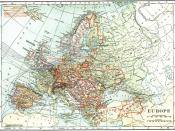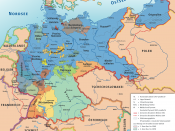After losing World War 1, Kaiser Wilhelm II abdicated and left in exile to Holland on the ninth of November in 1918 just before the armistice and on February 10, 1919, the new constitution was made in Weimar, and Freidrich Ebert became president. The constitution was drawn by Hugo preuss who thought that Germany needed both Germany liberal tradition and Western parliamentary democracy but Germany was not familiar with Democracy so the Weimar Republic had to face many problems.
Germany losing 13 percent of her territory, 10 per cent of her population, 15 percent of arable land, 75 per cent of iron and 68 per cent of zinc ore, 26 percent of her coal resources, the entire Alsatian potash and textile by singed Treaty of Versailles. These shows their industry destroyed. After War, Germany did not think they lost so they could not accept this results so they thought this happened because someone deceived them and they needed to blame someone.
Weimar republic signed Treaty of Versailles so people started to against Weimar republic. In 1923, seventy thousands of France and Belgium army invaded Ruhr to make Germany pay. German Government ordered begun passive resistance which ordered to do nothing but France did not move, killed 132 German and searched the thousands of German's house so Government decided to pay them to print money instead of working. French moved in 1925. The people in Ruhr hate French and blame government who signed the Treaty of Versailles. The Ruhr incident affected Germany's economic strongly. In 1923, there was a hyper-inflation. Germany's currency became more and more worthless because government printed lots of money to payback to France. People needed a wagon to buy something. Unemployment increase 2 per cent to 23 percent, and middle class found their save was...


